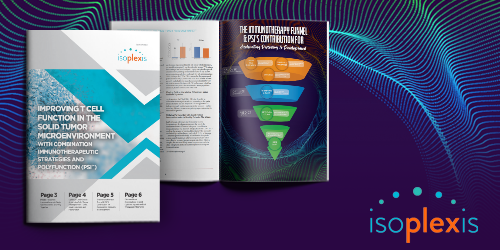
In recent years, cancer immunotherapies, in particular immune checkpoint blockade and combination therapies, have demonstrated remarkable success in treating multiple refractory cancers. One such therapeutic approach prevents T cell exhaustion by blocking the PD-1/PD-L1 pathway, which has shown tumor regression and long-term patient survival in many clinical trials. Yet, despite the excitement surrounding these successes, a significant number of patients with advanced melanoma experience disease progression despite treatment.
Understanding the potently immunosuppressive tumor microenvironment (TME) is critically important to deciphering the underlying mechanisms responsible for immunotherapy failure; this understanding may also help address other challenges facing immunotherapy’s full adoption, such as patient-to-patient variability and undesirable side effects. As such, a biomarker for in-depth profiling of anti-tumor immune responses is urgently needed.
Download this eBook from IsoPlexis to learn about:
Understanding the potently immunosuppressive tumor microenvironment (TME) is critically important to deciphering the underlying mechanisms responsible for immunotherapy failure; this understanding may also help address other challenges facing immunotherapy’s full adoption, such as patient-to-patient variability and undesirable side effects. As such, a biomarker for in-depth profiling of anti-tumor immune responses is urgently needed.
Download this eBook from IsoPlexis to learn about:
- Addressing challenges in solid tumors with the Polyfunctional Strength Index (PSITM)
- Using PSI to assess T-cell function in response to small molecules
- How PSI contributes to accelerating immunotherapy discovery and development
- Employing PSI to discover novel agonist and cell therapy combinations against solid tumors

